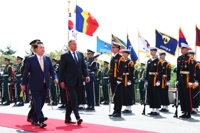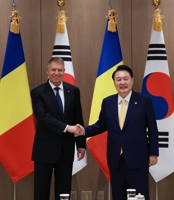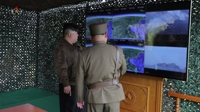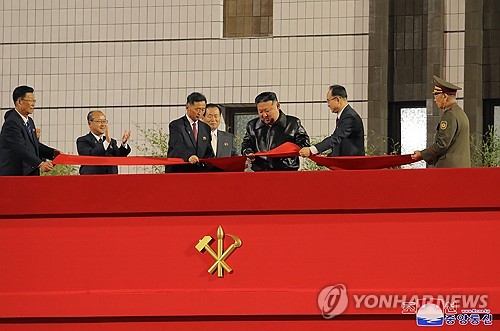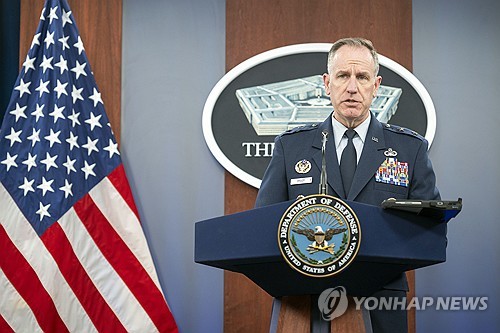(EDITORIAL from Korea Times on March 5)
War against corruption
New anti-graft law needs toughening, not weakening
Korea is a developed nation economically, but remains a developing country in terms of corruption. The world's 15th-largest economy is ranked 47th among 177 countries in the corruption perceptions index surveyed annually by Transparency International.
So the National Assembly's overwhelming passage of a comprehensive anti-graft bill Tuesday deserves celebration as setting a milestone in the nation's fight against corruption.
Titled the "Kim Young-ran Law" after a former Supreme Court justice and top sleaze-buster who initially drafted it, the new legislation calls for punishing public officials, journalists and teachers who accept cash donations or gifts valued at more than 1 million won ($910) with up to three years in prison, starting in October 2016.
What sets the new law apart from similar previous acts is that it would discipline the recipients of money and goods without requiring proof of quid pro quo corruption, and regardless of the relationship with their jobs.
It was a significant progress, given the deep-rooted, widespread "culture" here in which businesses and other interest groups "manage" civil servants, prosecutors, lawmakers and other people of influence with cash envelopes, junkets, golfing rounds and seasonable gifts, in all-the-year-round kickbacks.
We, along with all ordinary citizens who can neither give nor take bribes, welcome the legislation and hope it will serve as a catalyst to clean up Korean society.
This makes it all the more regrettable that the hard-won law has so many loopholes and other problems ― especially in terms of equity and ambiguity ― as to give its critics fodder to take issue with the law's enforcement or even its constitutionality. For example, the law exempted civic groups and most professionals, including lawyers and doctors, from the category of public figures, causing controversy about equity.
The new law also failed to include the "conflict of interest" provision, which prohibits officials from engaging in work related to people close to them. Most glaring, it excluded civil petitions to lawmakers from requests subject for legal scrutiny, under the pretext of difficulty in differentiating legal requests from illegal ones, allowing legislators ― supposedly one of the main target groups of the anti-bribery law ― to slip through it. Worse yet, the members of the 19th National Assembly will likely emerge largely unscathed from the law as their terms in office expire in May 2016.
All these should be reasons for toughening the law, not weakening it, however, by closing loopholes and supplementing defects. For example, it should include civic activists and professionals in its targets, not excluding journalists and teachers from the list under the pretext of ensuring equity.
The media people are right to suspect their inclusion in the group of potential bribe-takers would result in a crackdown on press freedom by law enforcement authorities acting on orders from heavy-handed leaders. Yet journalists and teachers need to think how the rest of society has regarded them ― peripherals of a corruptive circle. The possible abuse of police and prosecutorial power should be dealt with, but through separate reforms.
Officials in the executive and legislative branches should work together to perfect the law in the remaining one-and-a-half years. At stake is not just the revival of lost ethics, but Korea's survival as a livable society.
(END)
-
 Overdue debut of Korean abstract art pioneer Yoo Young-kuk at Venice Biennale
Overdue debut of Korean abstract art pioneer Yoo Young-kuk at Venice Biennale -
 Relax, immerse yourself in scents at Venice Biennale's Korean Pavilion
Relax, immerse yourself in scents at Venice Biennale's Korean Pavilion -
 S. Korea marks 30th anniv. of Korean Pavilion at Venice Biennale with contemporary art
S. Korea marks 30th anniv. of Korean Pavilion at Venice Biennale with contemporary art -
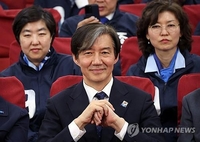 Ex-Justice Minister Cho slams Yoon's statement on crushing election defeat
Ex-Justice Minister Cho slams Yoon's statement on crushing election defeat -
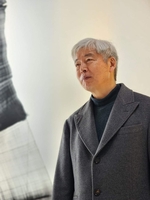 Artist Lee Bae captures ethereal Korean aesthetics at Venice Biennale
Artist Lee Bae captures ethereal Korean aesthetics at Venice Biennale
-
 Overdue debut of Korean abstract art pioneer Yoo Young-kuk at Venice Biennale
Overdue debut of Korean abstract art pioneer Yoo Young-kuk at Venice Biennale -
 Relax, immerse yourself in scents at Venice Biennale's Korean Pavilion
Relax, immerse yourself in scents at Venice Biennale's Korean Pavilion -
 Artist Lee Bae captures ethereal Korean aesthetics at Venice Biennale
Artist Lee Bae captures ethereal Korean aesthetics at Venice Biennale -
 S. Korea marks 30th anniv. of Korean Pavilion at Venice Biennale with contemporary art
S. Korea marks 30th anniv. of Korean Pavilion at Venice Biennale with contemporary art -
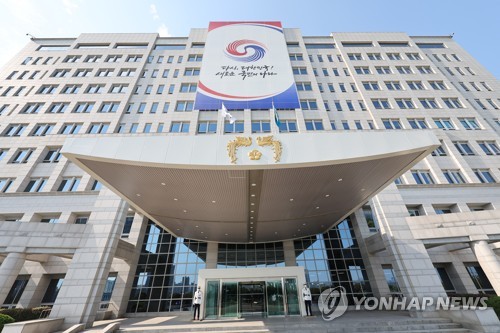 (LEAD) Presidential office denies Moon aides under consideration for PM, chief of staff
(LEAD) Presidential office denies Moon aides under consideration for PM, chief of staff
-
 Hybe says spinoff attempt by subsidiary label revealed clearly
Hybe says spinoff attempt by subsidiary label revealed clearly -
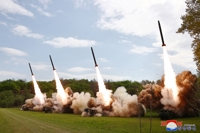 (LEAD) N. Korea says Kim guided simulated nuclear counterattack drill
(LEAD) N. Korea says Kim guided simulated nuclear counterattack drill -
 Hybe launches audit into NewJeans' label ADOR over alleged independence move
Hybe launches audit into NewJeans' label ADOR over alleged independence move -
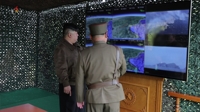 S. Korea warns N. Korea will face end of regime if it uses nuclear weapons
S. Korea warns N. Korea will face end of regime if it uses nuclear weapons -
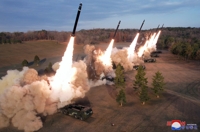 N. Korea says Kim guided simulated nuclear counterattack drills for 1st time
N. Korea says Kim guided simulated nuclear counterattack drills for 1st time















